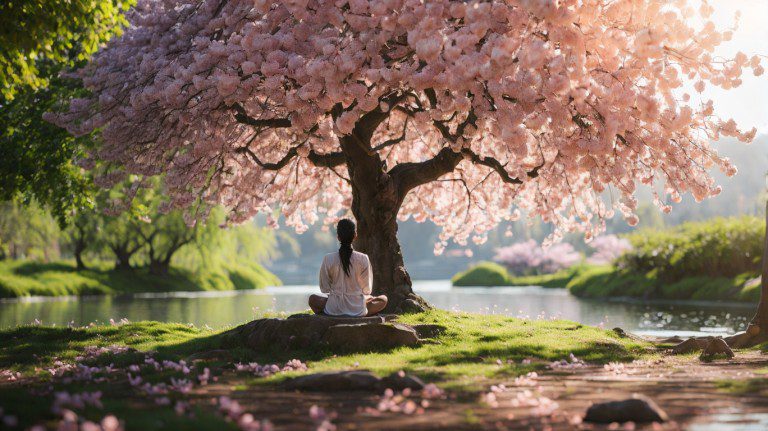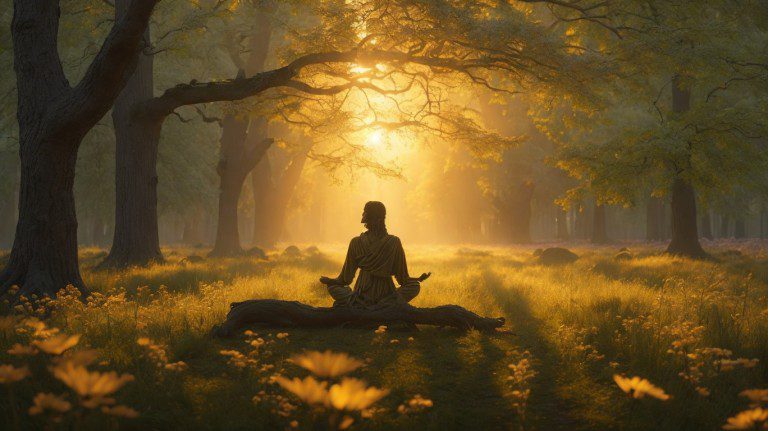Spirituality Facts Decoded: Navigating the Labyrinth of the Soul
Spirituality is such an incredible force in our lives! It’s mind-blowing how it can shape our mental health, physical well-being, and even our social relationships.
As I dive into the fascinating world of spirituality facts, I can’t help but feel inspired and introspective.
From understanding its concept to exploring different practices, this article will take you on a thought-provoking journey.
So get ready to embark on a path of freedom and discover the profound impact spirituality has on every aspect of our lives.
Key Takeaways
- Spirituality is a personal journey of self-discovery and growth.
- It has shaped cultural beliefs and practices throughout history.
- Spirituality has a significant impact on mental well-being.
- Artistic expression taps into creativity and spirituality.
Spirituality Facts: Understanding the Concepts
To truly grasp the concept of spirituality, you’ll need to delve deep into your own beliefs and experiences.
Understanding spirituality is not about conforming to a set of religious doctrines or blindly following rituals. It’s about embarking on a personal journey of self-discovery and growth.
Spirituality is unique to each individual; it encompasses our spiritual beliefs, values, and connection to something greater than ourselves.
It is through this exploration that we can experience a spiritual awakening, where we become aware of the profound interconnectedness of all things.
This awakening leads us on a path toward spiritual growth, where we strive to align our actions with our higher purpose.
Engaging in spiritual practices such as meditation, mindfulness, or prayer can further deepen our understanding and connection with the divine.
Now that we have explored the essence of spirituality, let’s dive into its historical context and how it has evolved over time.
The Historical Context of Spirituality
During the historical period, spirituality played a significant role in shaping cultural beliefs and practices.
It is fascinating to trace the historical origins of spirituality and witness its evolution over time.
From ancient civilizations to modern societies, spirituality has always held a profound cultural significance.
Its philosophical roots can be found in the quest for meaning and purpose in life, as well as the desire for connection with something greater than oneself.
Spirituality has deep religious connections, influencing various faith traditions across the globe.
Influential figures throughout history have emerged as spiritual leaders, guiding others on their path toward enlightenment and inner peace.
As we reflect on the historical context of spirituality, we are reminded of our collective journey toward freedom of thought and belief, inspiring us to explore our own spiritual nature and embrace the diverse expressions of spirituality that exist today.
The Role of Spirituality in Mental Health
The role of spirituality in mental health is often underestimated, but it can have a significant impact on one’s well-being.
Spirituality goes beyond traditional therapy and self-care practices, offering a deeper connection to ourselves and the world around us.
It can be a powerful tool in addiction recovery, helping individuals find strength and purpose in their journey toward healing.
Spirituality also plays a crucial role in building resilience, providing the inner strength needed to overcome life’s challenges.
When faced with emotional turmoil, spirituality offers solace and guidance, giving us the tools to navigate our emotions and find peace within.
It reminds us that we are not alone in our struggles and that there is always hope for brighter days ahead.
Embracing spirituality as part of our coping mechanisms can lead to greater emotional well-being and a sense of freedom from the burdens we carry.
Different Forms of Spiritual Practices
When it comes to spirituality, there are various forms of practices that can nourish and enrich our souls.
From the stillness of meditation to the expressive beauty of artistic spiritual practices, each offers a unique pathway toward inner growth and connection.
Taking time for solitary retreats allows us to delve deep within ourselves, gaining clarity and rejuvenation, while embarking on pilgrimages reminds us of the sacredness of our journey.
Ultimately, these practices contribute to building our spiritual capital – an invaluable resource that brings meaning, purpose, and fulfillment into our lives.
Forms of Meditation
One popular form of meditation is known as mindfulness, which involves focusing on the present moment.
Mindfulness meditation allows me to observe my thoughts and emotions without judgment, bringing a sense of calm and clarity to my mind.
Another powerful practice is loving-kindness meditation, where I cultivate feelings of love and compassion towards myself and others.
Transcendental meditation takes me beyond ordinary thinking, allowing me to access a state of pure awareness.
Guided visualization meditation helps me create vivid mental images that inspire and motivate me toward achieving my goals.
Mantra meditation involves repeating a mantra or sacred word, helping me focus my mind and connect with my spiritual essence.
Lastly, walking meditation allows me to be fully present in each step I take, grounding myself in the present moment.
These different forms of meditation enable me to explore the depths of my consciousness and find inner peace.
Transitioning into artistic spiritual practices: Just as meditation nourishes my soul through stillness, there are also artistic spiritual practices that allow for self-expression and creative exploration on this journey of spirituality.
Artistic Spiritual Practices
Explore artistic spiritual practices as a way to express yourself and tap into your creative potential.
Artistic expression is not just about creating something visually appealing; it is a profound form of communication that allows us to delve deep into our souls and connect with something greater than ourselves.
Here are three ways in which art can help us explore our emotions and enhance our spiritual growth:
- Creativity and Spirituality: When we engage in artistic activities, we access a state of flow where time seems to disappear, and our connection with the divine becomes more palpable.
- Art as Meditation: Creating art can be a meditative practice, allowing us to quiet the mind, find inner peace, and become fully present in the moment.
- Healing Power of Art: Art has the power to heal emotional wounds by providing an outlet for self-expression, allowing us to process our feelings in a safe and non-judgmental space.
Solitary Retreat Benefits
As I immerse myself in the world of artistic spiritual practices, I can’t help but reflect on the profound benefits of solitude and self-reflection.
In our fast-paced lives, finding moments of inner peace seems like an elusive dream.
However, retreating into solitude provides us with a sacred space to reconnect with ourselves and nature.
Solitary retreats offer a sanctuary for personal growth and transformation.
Away from distractions, we can delve deep into our thoughts and emotions, exploring the depths of our souls.
It is within these quiet moments that we uncover hidden truths and gain clarity on our life’s purpose.
Reconnecting with nature during these retreats allows us to witness the beauty and magic that surrounds us.
As we breathe in the fresh air, listen to the rustling leaves, and feel the earth beneath our feet, we become one with the natural world.
This connection nourishes our spirits and ignites a sense of reverence for all living beings.
So let us embrace solitude as a path toward self-discovery, inner peace, and personal growth.
Let us set aside time to retreat from the noise of society so that we may find solace in our own company.
And in this journey towards self-realization, may we rediscover the infinite wonders of nature that have always been there waiting for us.
Importance of Pilgrimage
Immerse yourself in the transformative power of pilgrimage as you embark on a journey that will deepen your connection to the sacred.
- Spiritual growth: Through pilgrimage, we open ourselves up to new experiences and perspectives, allowing for personal growth and spiritual development.
- Sacred destinations: Visiting places of religious significance allows us to connect with the divine energy present in these holy sites, creating a profound sense of awe and reverence.
- Personal transformation: The physical act of traveling to these sacred destinations often mirrors our inner spiritual journey, leading to self-discovery, healing, and inner peace.
Pilgrimage holds immense cultural significance across different faiths and traditions, reminding us of our shared humanity and interconnectedness.
It offers a path toward spiritual enlightenment by providing opportunities for introspection, prayer, and connection with a higher power.
As we explore the importance of pilgrimage in nurturing our spiritual lives, let us now delve into the value of spiritual capital…
Value of Spiritual Capital?
As I reflect on the importance of pilgrimage, I am reminded of the value of spiritual capital in my own life.
It is through my spiritual journey that I have experienced profound growth and transformation.
Spiritual enlightenment has become a guiding light, illuminating the path towards my true self.
In this quest for spiritual well-being, I have found immense support within a spiritual community.
Together, we encourage each other to delve deeper into our spirituality and embrace the transformative power it holds.
Through shared experiences and wisdom, we uplift one another on this sacred path.
Spiritual capital is not measured in material possessions or external achievements; rather, it lies in the richness of our inner world and the depth of our connection to something greater than ourselves.
It is an invaluable asset that fuels our spiritual growth and propels us towards a higher state of consciousness.
May we continue to nurture our spiritual capital, allowing its abundance to permeate every aspect of our lives and bring forth lasting joy and fulfillment.
The Impact of Spirituality on Physical Well-being
Spirituality can greatly enhance one’s physical well-being.
When we cultivate our spiritual well-being, we tap into the profound mind-body connection that exists within us.
This connection allows for holistic healing and brings about a multitude of health benefits.
Here are three ways in which spirituality positively impacts our physical well-being:
- Spiritual practices such as meditation and prayer reduce stress levels, boost the immune system, and promote overall vitality. They create a sense of calmness and inner peace that radiates throughout our entire being.
- Developing a strong spiritual foundation helps us navigate life’s challenges with grace and resilience. It provides us with the strength to overcome obstacles, leading to improved mental health and increased physical energy.
- By aligning ourselves spiritually, we become more attuned to our bodies’ needs, promoting healthier lifestyle choices such as regular exercise, balanced nutrition, and adequate rest.
Embracing spirituality not only nourishes our souls but also uplifts our physical selves, enabling us to live vibrant lives filled with joy and freedom.
Spirituality and Its Influence on Social Relationships
When we cultivate our spiritual well-being, it not only enhances our physical health but also influences our social relationships in a positive way.
Spirituality is the essence that connects us to something greater than ourselves, reminding us of our interconnectedness with others and the world around us.
It awakens empathy within us, allowing us to understand and share in the joys and sorrows of those around us.
Through spirituality, we learn the power of forgiveness, releasing ourselves from the burden of resentment and fostering harmony in our relationships.
It encourages community building, bringing people together based on shared beliefs and values.
In times of conflict, spirituality provides a path toward resolution through compassion and understanding.
Moreover, it ignites altruism within us, inspiring acts of kindness and selflessness towards others.
Lastly, spirituality cultivates emotional intelligence by helping us recognize and regulate our own emotions while empathizing with others.
Embracing spirituality enriches not only our individual lives but also strengthens the fabric of society as a whole.
Frequently Asked Questions
Can Spirituality Be Practiced Without Any Religious Beliefs or Affiliations?
Personally, I believe exploring spirituality without religious beliefs or affiliations is possible and liberating. Non-religious spirituality allows for personal spiritual practices, fostering mindfulness, self-discovery, and the many benefits of spirituality without religious constraints.
How Can Spirituality Be Incorporated Into Daily Life to Promote Overall Well-Being?
Incorporating mindfulness, spiritual rituals, connecting with nature, gratitude practices, meditation techniques, and journaling prompts into my daily life promotes overall well-being. It allows me to find inner peace and cultivate a deeper sense of self-awareness.
Are There Any Specific Scientific Studies or Research That Support the Benefits of Spirituality?
There is a growing body of scientific evidence that supports the benefits of spirituality. Studies show its neurological effects, psychological benefits, impact on physical health, and role in enhancing emotional resilience, stress reduction, and life satisfaction.
Can Spirituality Help in Coping With Grief and Loss?
Spirituality can be a powerful tool in coping with grief and loss. Through spiritual practices, we can embark on a healing process, find meaning in our pain, seek emotional support, connect with others, and ultimately find peace within ourselves.
What Are Some Practical Tips for Individuals Interested in Exploring Their Own Spirituality?
When it comes to exploring my own spirituality, I find that incorporating meditation practices, mindfulness exercises, and connecting with nature are practical techniques for personal growth. They help me find inner peace and deepen my understanding of the world around me.
Conclusion
In conclusion, spirituality is a powerful force that can bring meaning and purpose to our lives.
It has the ability to transcend time and connect us with something greater than ourselves.
As we explore different spiritual practices and delve into the historical context of spirituality, we come to understand its profound impact on our mental health, physical well-being, and social relationships.
So, I ask you, as you embark on your own spiritual journey, what depths will you uncover?
What truths will you discover within yourself?






